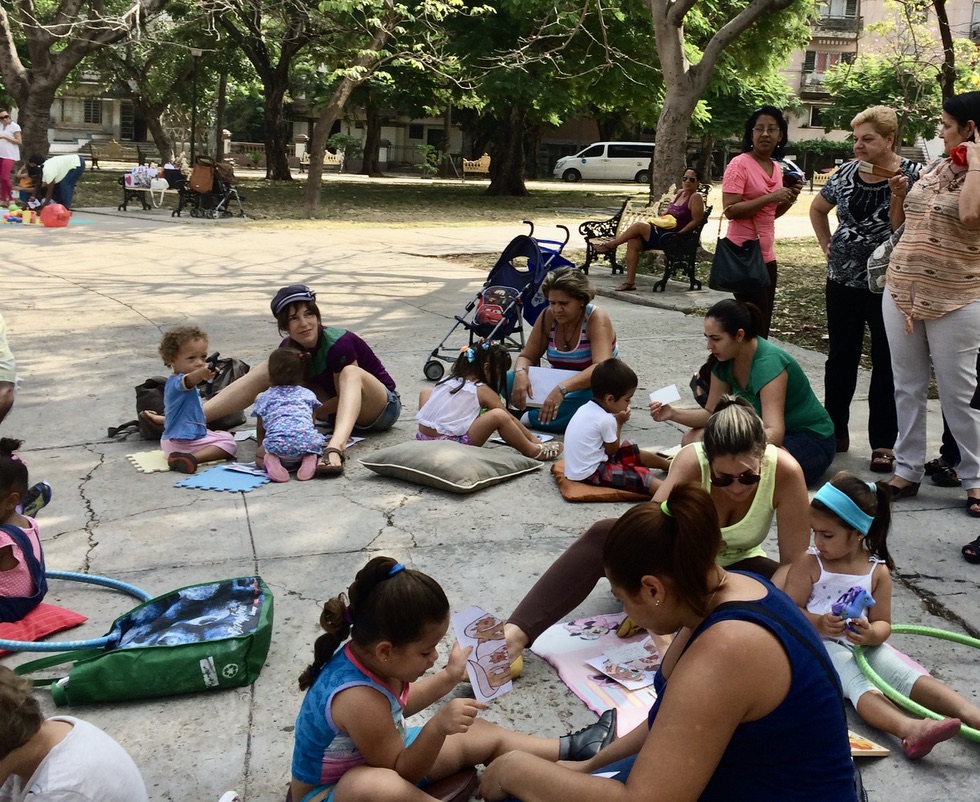COMMUNITY POLYCLINICS AND FAMILY DOCTORS TEAMS ARE THE CENTRAL PIECE OF THE MOST IMPORTANT HEALTH PROGRAMS. THE COMMUNITY POLYCLINIC CONCEPT WAS INTRODUCED IN 1976 AND AT THE BEGINNING THEY WERE RESPONSIBLE FOR PROVIDING PRIMARY HEALTH CARE. IN 1984, THE CONCEPT OF THE FAMILY DOCTOR ENHANCING THE HEALTH SYSTEM’S ABILITY TO DELIVER ON PREVENTION AND COMMUNITY-HEALTH ANALYSIS, AS WELL AS CLINICAL SERVICES, WAS INTRODUCED. SINCE THEN, FAMILY PHYSICIANS HAVE WORKED WITH NURSES, SOCIAL WORKERS, EPIDEMIOLOGISTS AND PSYCHOLOGISTS AS ONE TEAM. FAMILY PHYSICIANS HAVE SPECIALIZED IN PEDIATRICS, OBSTETRICS, GYNECOLOGY, GENERAL MEDICINE AND EPIDEMIOLOGY. WORKING IN TEAMS, THEY CARRY OUT HEALTH PROMOTION, HEALTH EDUCATION, AND DISEASE PREVENTION ACTIVITIES, DIAGNOSE DISEASES, DESIGN HEALTH PLANS AND COMMUNITY MOBILIZATION.

In January 2015 Drs. Stephen Lye and Yeneir Vera visited the Early Childhood Centre at the Polyclinic Julian Grimau in Arroyo Naranjo Municipality in Havana. The community based polyclinic houses many different medical offices and an Early Childhood Centre which has several stimulations rooms, incl. gym, visual stimulation, music, ballet, etc.
PRIMARY HEALTH CARE – ROLE OF THE POLYCLINICS AND FAMILY DOCTOR PROGRAM
Cuba has a network of 473 polyclinics, each of which oversees thirty to forty family doctors. Family doctors, who live in and are part of the community, are responsible for the health of 150 to 200 families. The staff is multidisciplinary and includes a wide range of professionals. Currently, the average polyclinic offers 22 services, including rehabilitation, x-ray, ultrasound, optometry, endoscopy, thrombolysis, emergency services, traumatology, clinical laboratory, family planning, emergency dentistry, maternal–child care, immunization, and diabetic and elderly care. Various other specialties – including dermatology, psychiatry and cardiology – are available too, in addition to family and internal medicine, pediatrics, and obstetrics and gynecology.
The polyclinic is also a core for medical and educational training. Students in medicine and nursing receive part of their training at a polyclinic, which is often where they will work after graduation. Polyclinics collect data for important scientific research, and are conduits for scientific advances. The data collected are used by health authorities to evaluate the effectiveness of the polyclinic programs. Scientists are frequently appointed to polyclinics, where they undertake academic research and facilitate the transfer of knowledge to and from line staff.
CONTRIBUTION OF THE POLYCLINICS TO THE EARLY CHILDHOOD DEVELOPMENT SYSTEM
FAMILY PLANNING CONSULTATIONS AND PRECONCEPTION RISK PROGRAM
Polyclinics have family planning consultations and preconception program. As part of this program, family doctors classify all women in childbearing age in their communities, according to potential risk factors for complications in pregnancy in the future, such as diabetes, high blood pressure, anemia, etc. Primary care staff work with women who wish to become pregnant to mitigate risk factors and plan conception for when the woman’s physical condition is optimal. The program is structured with specialized family planning consultations at all polyclinics which are equipped with effective and modern methods of fertility control and are aimed at cases of higher reproductive risk that cannot be solved with traditional methods or the family doctors. These consultations provide more specialized attention both in conception and infertility, and now provide prenatal care for patients with certain unresolved perinatal risk. The team includes gynecologists, family physicians, psychologists, social workers, nurse midwives and consultations with other specialists can be arranged. The objective of the program is to reduce the risk of pregnancy, the risk of low birth weight, the incidence of teenage pregnancy, the incidence of induced abortions and to ensure the quality of menstrual regulations and abortions if necessary. This program also facilitates increased participation of men in all family planning activities, provides appropriate services for infertility and at the same time participates in the established distribution of contraceptive methods and offers sterilization services for men and women.
NATIONAL MATERNAL-CHILD HEALTH PROGRAM (PAMI, THE SPANISH ACRONYM)
The centralized Maternal-Child Health Program (Programa Nacional de Atencion Materno-infantil, or PAMI) was established in 1970. It has the main responsibility of ensuring the health of women of childbearing age. The success of PAMI’s efforts is documented by one of the most rapid declines in infant mortality ever recorded. Under the leadership of this program, governmental sectors as well as community organizations collaborate to provide prenatal care and other health services to women and their children. Such services include free screening and diagnostic testing as well as the availability of maternity homes in every municipality to provide medical assistance and nutritionally balanced, calorically dense meals 24 hours/day for women with high-risk pregnancies. According to World Bank data, 100% of pregnant Cuban women receive prenatal care, defined as medical and nursing care recommended for women before and during pregnancy.
EARLY PROGRAMS FOR CHILDREN WITH DISABILITIES
Cuba has a Diagnosis and Guidance Centre in every municipality for the early detection of developmental disabilities and provision of recommendations on the steps that should be taken, for example, in the cases of deaf, blind and autistic children. These centres have multidisciplinary teams and are the first link in special education. Children are referred from the family doctors’ offices or day care centres. The most severe cases identified are handled by the Ministry of Health’s Early Intervention Programs and by special classrooms incorporated into the daycares that are equipped to deal with disabled and mentally retarded children and teachers. Seventy-seven percent of Cubans with mental retardation have attended school. Currently, there are 421 special schools across the country.
Go To…
